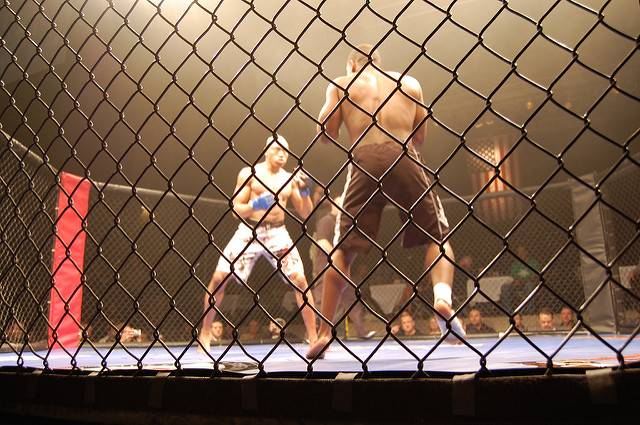
They say there is a first time for everything, and after 20 long years, the time has finally arrived. With the state of New York’s legalization of mixed martial arts, New York City will host UFC 205, which has been deemed the greatest fight card in UFC history. Headliners Irishman Conor Mcgregor and Joanna Jedrzejczyk of Poland are expected to attract large numbers of attendees and evoke an emotional connection among fans. Events such as the World Cup and Superbowl are cultural symbols, and UFC 205 is shaping up to be no different.
The UFC is a major attraction in sports right now. The urge to emotionally connect with others in an excited crowd is a compelling reason for buying tickets to major sporting events like this. People who attend a big match-up often experience eustress — positive forms of stimulation that lead to elevated levels of excitement.
Randal Collins. 2004. “Interaction Ritual Chains”. Pp. 75-90 in Micro-Sociological Analysis. 3rd edition, Contemporary Sociological Theory, edited by Craig Calhoun, Joseph Gerteis, James Moody, Steven Pfaff, and Indermohan Virk. John Wiley & Sons, Ltd.
Daniel L. Wann, Merrill J. Melnick, Gordon W. Russell, Dale G. Pease. 2001. Sports Fans: The Psychology and Social Impact of Spectators. New York, NY: Routledge.
Porri and Billings have found that people are drawn to sporting events that differ from traditional, mainstream sports like baseball and football. MMA athletes’ unique personalities and set of combative skills generate interest in a different way than team sports do. Social acceptance and mass popularity of attending an event also influences an individual’s decision to splurge and see the big fight. The bigger the event, the greater the desire to be part of the experience, especially if friends and family think it would be cool to attend.
Seungmo Kim, T. Christopher Greenwell, Damon P.S. Andrew, Janghyuk Lee, and Daniel F. Mahony. 2008. “An Analysis of Spectator Motives in an Individual Combat Sport: A Study of Mixed Martial Arts Fan.” Sport Marketing Quarterly 17: 109-119.
Sarah Porri and Andrew C. Billings. “No Limits: Sensation Seeking and Fandom in the Sport Culture of the X Games.” Pp. 91-100 in Sports Fans, Identity, and Socialization: Exploring the Fandemonium, edited by Adam C. Earnheardt, Paul M. Haridakis, and Barbara S. Hugenberg. Lanham, MD: Lexington Books
As the sport of mixed martial arts continues to grow, so does the research on this new sport that is captivating spectators. Other lines of research into MMA investigate the reworking of masculine identity and reasons why participants choose to participate, whether it is for competition or for health reasons.
Kyle Green. 2015. “Tales from the Mat: Narrating Men and Meaning Making in the Mixed Martial Arts Gym.” Journal of Contemporary Ethnography 45 (4): 419-450.

Comments